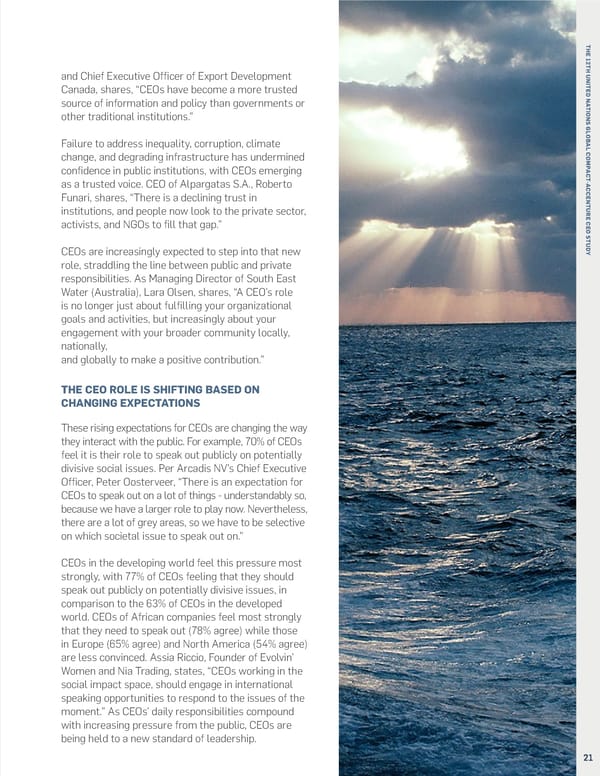T H E 1 2 T TODAY’S CHALLENGES ARE ALSO DIFFERENT H U and Chief Executive Officer of Export Development N I T – THEY SPAN BEYOND TRADITIONAL E Canada, shares, “CEOs have become a more trusted D N BUSINESS BOUNDARIESsource of information and policy than governments or A “If you don’t give back, don’t T I O contribute, and do not rise up to other traditional institutions.” N CEOs are not only challenged by the multitude of S G the social disparities, then you’re L O problems they are facing, but also by the breadth of B not part of the evolving society.” Failure to address inequality, corruption, climate A issues falling outside the traditional business sphere, L C O Anil Sardana, change, and degrading infrastructure has undermined M with 70% of challenges selected going beyond usual P Managing Director of Adani Power Limited A confidence in public institutions, with CEOs emerging C profitability concerns. While the greatest challenges T - as a trusted voice. CEO of Alpargatas S.A., Roberto A C for CEOs are inflation and price volatility (98%), along C E Funari, shares, “There is a declining trust in N with talent scarcity (96%), the next two challenges T U institutions, and people now look to the private sector, R are threats to public health and climate change – two E C activists, and NGOs to fill that gap.” E “My role has not changed when it challenges that reach past the historic bounds that O S T comes to financial performance, CEOs have had to manage (Figure 2). As Rob Fauber, U D but my role has re-balanced to President and Chief Executive Officer of Moody’s, CEOs are increasingly expected to step into that new Y weigh more equally between the notes, “Today’s leaders face a complex, interlinked role, straddling the line between public and private people and financial performance.” world of risks. From rising inflation, economic responsibilities. As Managing Director of South East Belén Garijo, uncertainty, and geopolitical tensions to the pandemic, Water (Australia), Lara Olsen, shares, “A CEO’s role Chair of the Executive Board and the climate crisis, and cyberattacks, they are looking is no longer just about fulfilling your organizational CEO of Merck KGaAfor solutions to help navigate an unprecedented goals and activities, but increasingly about your period of uncertainty and build resilience.” engagement with your broader community locally, nationally, THE RISE OF “S” IN ESG IS REDEFINING THE and globally to make a positive contribution.” “As a CEO, you don’t want to ROLE THAT BUSINESS IS EXPECTED TO PLAY impose your values or political THE CEO ROLE IS SHIFTING BASED ON views on your team, or your From these challenges, the most notable change has CHANGING EXPECTATIONS organization. You must remain been the rise of social sustainability expectations objective because a team is made on CEOs and businesses. As Chairman and CEO of These rising expectations for CEOs are changing the way of individuals with differing world Ecolab, Christophe Beck, states, “We have a social they interact with the public. For example, 70% of CEOs views. However, CEOs do need to be role that’s growing in an incredible way. It can be feel it is their role to speak out publicly on potentially more vocal on the things that are important for an organization, and global questions like water resilience and access, divisive social issues. Per Arcadis NV’s Chief Executive lead through those values.” public safety, or homelessness. I used to think that’s Officer, Peter Oosterveer, “There is an expectation for government’s role and I don’t have to do anything CEOs to speak out on a lot of things - understandably so, Gimena Peña Malcampo, about it – that’s not true anymore.” CEOs are taking because we have a larger role to play now. Nevertheless, CEO of Pier2 Marketingthis shift in expectations to heart: 91% of CEOs believe there are a lot of grey areas, so we have to be selective that their role is to protect local communities in the on which societal issue to speak out on.” regions they operate. D Narain, President of Bayer South Asia & Global Head of Smallholder Farming, CEOs in the developing world feel this pressure most “We’re in a crisis of leadership now. notes, “Companies increasingly recognize they have strongly, with 77% of CEOs feeling that they should The problems that we’re working a critical role to play in not only addressing complex speak out publicly on potentially divisive issues, in to solve are solvable, so our role - problems like climate change, but also in improving the whether it be business leaders or world—environmentally, socially, and economically.”comparison to the 63% of CEOs in the developed political leaders - is to lead with world. CEOs of African companies feel most strongly passion and come together to This rise in CEO expectations is coupled with a that they need to speak out (78% agree) while those implement solutions.”in Europe (65% agree) and North America (54% agree) loss of confidence in governments and multilateral are less convinced. Assia Riccio, Founder of Evolvin’ George Oliver, institutions. According to the Edelman Trust Chairman and CEO of Johnson ControlsBarometer, business has emerged as the most Women and Nia Trading, states, “CEOs working in the trusted institution (61%), followed by NGOs (59%) social impact space, should engage in international 5 speaking opportunities to respond to the issues of the and governments (52%). Mairead Lavery, President moment.” As CEOs’ daily responsibilities compound with increasing pressure from the public, CEOs are being held to a new standard of leadership. 205. Edelman (2022) 2022 Edelman Trust Barometer: The Cycle of Distrust. 21
 Accenture CEO Study United Nations Global Compact Page 20 Page 22
Accenture CEO Study United Nations Global Compact Page 20 Page 22